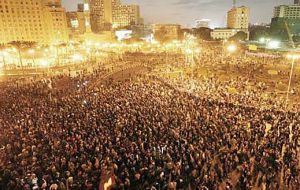MercoPress. South Atlantic News Agency
Syrian government kills 23 peaceful protestors on Muslim day of prayer
 Thousands also marched on Cario’s Tahrir Square demanding an end to corruption
Thousands also marched on Cario’s Tahrir Square demanding an end to corruption Protests erupted across much of the Arab world on the Muslim day of prayer, with demonstrators killed in Syria and Yemen while Egyptians staged one of the biggest rallies since President Hosni Mubarak's fall.
In Syria, 23 people were killed on Friday, sources in the southern Syrian city of Deraa said, in attacks on protesters.
Five people were shot dead in Yemen and at the heart of the Arab protest movement; Cairo's Tahrir Square military police beat protesters and fired shots to disperse crowds demanding Mubarak's prosecution as discontent with military rule grows.
In Saudi Arabia, Shiites protested in the oil-producing east to call for the withdrawal of Saudi troops from Bahrain, while in Oman, a planned protest was prevented by security.
Friday has become a peak day of protest for many Arabs since popular demands for freedom, democracy and an end to corruption began in Tunisia late last year and spread across the region.
In Syria, security forces opened fire on thousands of demonstrators in the southern city of Deraa as protests against President Bashar al-Assad flared in several towns.
A volunteer at Deraa hospital and an activist said 23 people were killed and 120 wounded. It took the death toll in three weeks of protests to more than 90.
Protests in Yemen descended into violence in which at least five people were killed and dozens wounded as President Ali Abdullah Saleh rejected a Gulf Arab plan to secure an end to his 32 years in power. The deaths bring the toll from clashes with security forces this week to at least 26.
Three protesters were shot dead in Taiz and 150 were wounded by gunfire, 10 of them critically doctors said. Some 200 were hurt by tear gas inhalation.
Meanwhile tens of thousands of Egyptians in Tahrir Square demanded Mubarak's prosecution and accused the military of being too slow to root out corruption from his era.
Friday's protest had swollen by early afternoon to at least 100,000, indicating growing frustration with the army which has enjoyed broad support since it took control of the country.
“It's a strong message that the revolution is not over yet and is still going on and will not quieten down before its goals are realised,” said Hassan Nafaa, a professor of political science and a prominent figure in the reform movement.




Top Comments
Disclaimer & comment rulesCommenting for this story is now closed.
If you have a Facebook account, become a fan and comment on our Facebook Page!